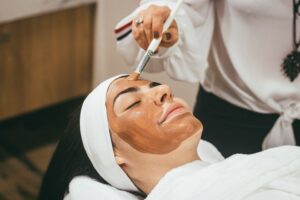
In today’s rapidly evolving world, aesthetics has become a vital part of our lives, influencing everything from skincare and beauty treatments to visual design and art. Whether it’s a skincare professional providing a personalized facial treatment, a makeup artist enhancing someone’s natural features, or an interior designer creating an atmosphere that evokes emotion, aesthetics plays a fundamental role in shaping experiences and improving lives. Education in aesthetics is crucial to mastering the knowledge and skills necessary to provide high-quality services, remain competitive in the industry, and meet the growing demands of clients who seek professional expertise. This article explores the essential role of education in aesthetics, highlighting the importance of foundational knowledge, skill development, and continuous learning in this dynamic field.
The Importance of a Strong Educational Foundation
A solid education is the cornerstone of a successful career in aesthetics. To truly excel in any aesthetic discipline—whether skincare, makeup, or design—understanding the fundamental principles is paramount. In skincare, for example, knowing the anatomy and physiology of the skin, understanding how various skin types respond to different treatments, and learning about the science behind skincare ingredients and their effects on the skin are essential to providing safe and effective services.
In makeup artistry, learning the techniques for contouring, highlighting, and applying products to accentuate features requires a thorough understanding of facial anatomy and color theory. Whether you’re working in aesthetics or design, knowledge is key. Education ensures that professionals understand the underlying science, the best practices, and how to apply these in real-world situations to produce the best possible results.


Skill Development through Practical Education
While theoretical knowledge forms the foundation, hands-on training is what truly separates an average aesthetician from an expert. Education in aesthetics goes beyond classroom learning, offering students the opportunity to practice and hone their skills. This includes practicing techniques like facials, massage, makeup applications, and advanced procedures such as chemical peels or microdermabrasion. Each skill needs to be practiced repeatedly under the guidance of experienced instructors to gain proficiency.
Practical education in aesthetics also teaches students the importance of attention to detail and client care. In aesthetic treatments, each client’s needs are unique, and the ability to adapt to different skin types, preferences, and sensitivities is a skill that requires practical exposure. By performing real-world treatments in a controlled, supervised setting, students develop confidence, critical thinking skills, and a refined technique that will serve them throughout their careers.
Keeping Up with Industry Trends through Continuing Education
The world of aesthetics is continually evolving, with new trends, technologies, and products emerging regularly. From the introduction of advanced skincare technologies like LED light therapy and radiofrequency treatments to the ever-evolving world of cosmetic surgery and non-invasive procedures, education must be an ongoing process to stay relevant. Professionals in aesthetics must stay informed about these innovations to offer clients the most advanced and effective treatments available.
Continuing education in aesthetics involves regularly attending workshops, seminars, and training programs that update professionals on the latest developments in the field. For instance, the development of cosmetic ingredients and skincare formulations has led to the emergence of more natural, organic, and sustainable products. Estheticians must understand the effectiveness of these ingredients and learn how to incorporate them into their treatments to meet client expectations for safer, more eco-friendly options.
Additionally, the rise of digital aesthetics, including virtual consultations, online tutorials, and digital makeup applications, has transformed how professionals engage with clients. Understanding how to leverage new technologies and platforms is an important part of continuing education, as it allows aesthetic professionals to offer more personalized and convenient services while maintaining high standards.
The Role of Specialized Education in Career Growth
A career in aesthetics offers numerous paths, from facial treatments and makeup artistry to hair removal, body contouring, and medical aesthetics. Specialized education plays a pivotal role in helping professionals pursue niche areas within the field, allowing them to expand their expertise and offer a wider range of services.
For example, estheticians who want to specialize in medical aesthetics might pursue additional certifications in laser treatments, Botox injections, or chemical peels. On the other hand, a makeup artist may decide to pursue training in special effects makeup or bridal makeup to cater to a specific client base. Specialized education provides a competitive advantage, enabling professionals to stand out in a crowded market and offer highly sought-after services.
Furthermore, specialized education not only increases earning potential but also opens up opportunities for advancement. Those who pursue advanced certifications or specialized training often find themselves in leadership roles, managing spas or clinics, or even teaching and mentoring the next generation of aestheticians.
Building Client Trust and Professionalism
In aesthetics, trust is an essential part of the client-provider relationship. Clients seek professionals who are knowledgeable, skilled, and trustworthy. Education plays a significant role in building that trust by ensuring that professionals have the competence to deliver high-quality services while adhering to safety protocols and ethical standards.
An education in aesthetics also instills professionalism in practitioners. Understanding client confidentiality, maintaining proper hygiene, and following legal and regulatory guidelines are all part of a well-rounded aesthetic education. Moreover, a strong educational background provides professionals with the confidence to offer personalized consultations, where they can effectively communicate treatment options, expected outcomes, and aftercare instructions. This trust and professionalism are key to fostering long-term relationships with clients, which in turn, leads to repeat business and referrals.
The Impact of Education on Client Outcomes
The ultimate goal of education in aesthetics is to improve the outcomes for clients. Whether it’s helping someone achieve healthier skin, a more youthful appearance, or simply a feeling of relaxation and rejuvenation, a well-educated aesthetician can make a significant difference in the quality of care provided. Skilled professionals who are educated in the latest techniques, products, and safety standards are better equipped to deliver treatments that not only meet but exceed client expectations.
By understanding the unique needs of each client and offering customized services based on their goals, aestheticians can achieve remarkable results. The knowledge gained through education allows professionals to offer treatments that are tailored to individual skin types, conditions, and concerns. Furthermore, when aesthetic treatments are performed correctly and safely, clients experience better, longer-lasting results, leading to greater satisfaction and enhanced reputation for the professional.
Conclusion
Education in aesthetics is essential for both personal growth and the success of a professional career. From understanding the science behind skincare to gaining hands-on experience in various treatments, education forms the bedrock of expertise in this industry. Continuous learning, staying updated on industry trends, and pursuing specialized certifications are key to long-term career growth and client satisfaction.
In an industry where trends are constantly evolving and client needs are becoming more diverse, staying educated ensures that aesthetic professionals can offer the best possible care. Education empowers aestheticians to make informed decisions, provide effective treatments, and build lasting relationships with their clients. As the beauty and wellness industry continues to expand, those who invest in their education will remain at the forefront, shaping the future of aesthetics and enhancing the lives of countless individuals.



